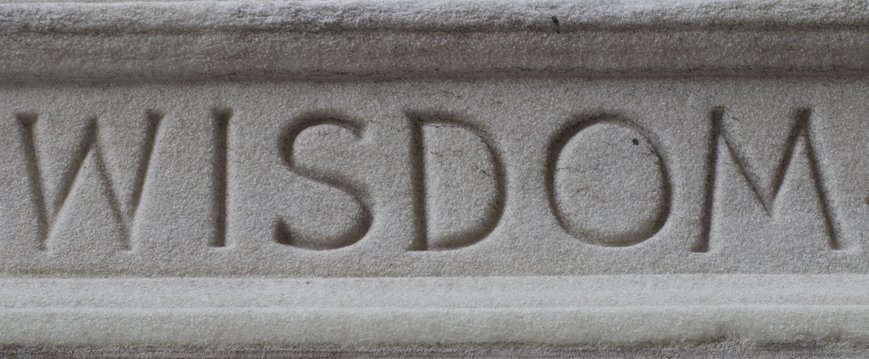
Conclusion of yesterday’s column.
Wisdom and Age
Does wisdom have anything to do with age? Not all elderly people are considered wise, but many are. And by virtue of being old, an elderly person usually has the benefit of the doubt due to longevity alone. ‘She’s old, so she must be wise,’ is the prevailing prejudice, not entirely without merit.
When I first began work as a psychotherapist in my early twenties, I looked young for my age. This sometimes created problems with new therapy clients, because they felt someone could not be both wise and young. ‘I want to discuss my problems with someone older,’ some would complain. A supervisor from that time once asked me, ‘Do they say this only when first meeting you, or after you have worked with them a session or two?’ It was always at the first meeting; never after that. This must mean the people decided that I was wise, or at least wise enough, to help them despite initial concerns about my being (looking) so young.
Personal experience seems necessary for wisdom. Yet how do we explain a young person wise beyond his or her years? Such a person is better and quicker at grasping what’s true from the experience of others.
In other words, what a wise young person lacks in experience, she makes up for in absorbing and relating to the experiences of others. The capacity for seeing from another’s point-of-view is important.
For example, I don’t have children. But I have talked to thousands of therapy clients over the years who have children. One client expressed surprise that I don’t have children when he said, ‘You sure sound like someone who knows what it’s like to have children.’ That’s probably because I acquired a lot of wisdom by listening very carefully, and identified distinctive, logical patterns from those experiences.
Wisdom Results in Satisfaction
Intelligence alone is not enough, but neither is wisdom. When the gradual process of wisdom is acquired and molded by intelligence, that’s when life results in a sense of satisfaction.
Wisdom is knowledge derived from one’s years of sensory experience. You may make wise comments and have them denoted by others as ‘words beyond your years.’ This could be a result of assimilating points of view from older, more experienced figures and expressing them to others. You therefore appear to be wise beyond your years.
While wisdom tends to be a result of the passage of time, intellect is an immediate, physical ability where wisdom or perspective can be acquired, or more easily expanded upon.
Another version of ‘wise beyond your years’ could be someone who’s highly intelligent and able to figure out something that usually takes years of learning. Thus intelligence has the potential to overlap wisdom.
Neither wisdom nor intelligence are completely divorced from knowledge.
Wise Beyond Your Years
‘Wise beyond your years’ implies you know something you’re not yet supposed to know because of youth. But it’s not the knowledge that’s key. A young person can possess knowledge beyond his elders, but what we do not expect is the perspective (or dialectical reasoning) at that age.
If wisdom could speak, perhaps it would say, ‘I know what this is, I have seen it before and I have a certain perspective about it.’ Of course, intelligence must be part of it. Maybe wisdom comes from being a self-reflective thinker. A person at age 60 or 80 might not seem wise at all, and perhaps this is due to a lack of obvious self-reflection.
Being a self-reflective thinker is a choice. It’s a choice which may add extra pages of wisdom, if the self-reflective thinker abides by the rules of logic and verifiable facts of reality.
If you think about it, one of the reasons elderly people do seem wiser is because they exhibit a recognition about the connected nature of events. ‘Yes, I’ve seen that before.’ It’s heightened experience, but more than that it’s a capacity to see the interconnection among events or objects. That’s what makes it wisdom. Self-reflection is a way of augmenting your pool of wisdom.
Let’s say you have someone who is 80 and someone who is 21. Based on some number of trials [i.e., opportunities to learn from life] with sensory experience as the default vessel for acquiring wisdom, the adult will often get the nod as the ‘wiser’ one. But the younger person can intensify his or her wisdom through increased self-reflection applied to a greater number of attempts at life experience.
In short, wisdom is something other than knowledge and intelligence. Knowledge and intelligence are involved, but wisdom refers to a capacity for judgment combined with perspective. It also involves empathy and a willingness to see from another’s point-of-view.
Wisdom can arise from experience, but it’s not experience by itself. A wise person is someone who understands not only his or her own experiences, but also the probable experiences of others. Wisdom involves not only experience and knowledge, but also inference.
Wisdom, like all human values and virtues, ultimately arises from thinking. Thinking is the distinctively human means of survival, and it’s what makes all human values and objectives possible.
A wise person appreciates the value of thinking, most of all.
Jose Ruenes, who co-wrote this article with Dr. Hurd, is an undergraduate studying psychology at Florida International University in Miami.
Be sure to “friend” Dr. Hurd on Facebook. Search under “Michael Hurd” (Rehoboth Beach DE). Get up-to-the-minute postings, recommended articles and links, and engage in back-and-forth discussion with Dr. Hurd on topics of interest.
